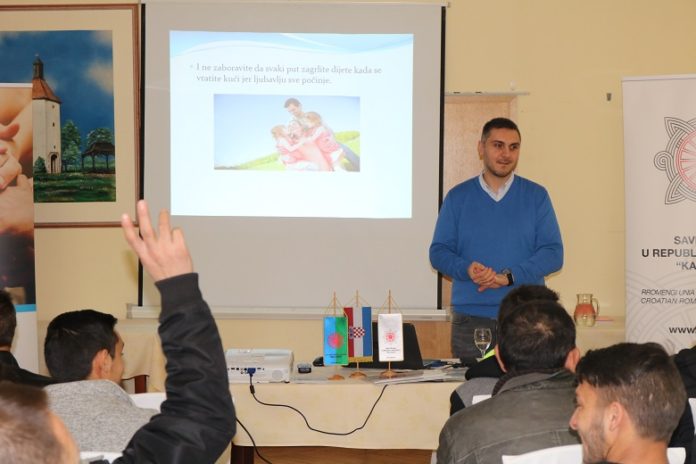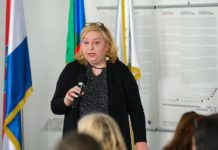Safeguarding health and preventing addiction is important for every individual, but for society as a whole as well. Croatian Romani Union “KALI SARA” is particularly aware of this, carrying out educational workshops for years to promote healthy living and prevention of alcoholism and drug abuse. This year's two-day workshop was held in Koprivnica – Križevci County on 10 and 11 February, and besides the above mentioned topics key lecturer Branko Kajtazi, MD specifically referred to peer violence as a burning problem of modern society. Street violence spilled over the Internet making the reduction of unacceptable behaviour of children and youth one of the biggest challenges for the community.
Lecturer Branko Kajtazi ever since he was a boy dreamed of becoming a doctor. His father,
Ramadan Kajtazi was also a doctor, so they often talked about his job at their home. Kajtazi, like other children, liked cars and other toys, but he was always feeling completed when helping others. He mentions this as the most important reason for enrolment in the Secondary Medical School, and later the graduation at the School of Medicine, University of Belgrade.
“Graduating at the School of Medicine really requires a lot of work, effort, and personal sacrifice – it is very difficult and is ungrateful. I am certain that I have made a right choice of study, because even nowadays when I perform my job, although difficult and stressful, I enjoy working, Im trying to make progress, I specialise and dedicate myself to the patients and the area I am working in, namely neurology.”
Kajtazi has been cooperating with the Croatian Romani Union “KALI SARA” since 2009 as a lecturer in educational workshops. He cites a lack of basic knowledge of self-care and health as a major problem of the Roma. Regardless the availability of health insurance and treatment options, most of them do not use those.
Where does the solution lie?
“Exclusively and completely in the primary health care, education and seminars. That’s the only way to reach their consciousness. It is important to know how to do basic things such as how to properly wash your hands, teeth and what makes a proper diet, and on the other hand – how to resist a large amount of drugs, diseases and addiction, especially in socially disadvantaged areas. These people live like a ghetto and this has to be changed, and this is only possible with education. We should stoop to their level of thinking and thus enable them to understand that access to a doctor is the basis of everything.”
The Roma standard of living is considerably lower than the standard of the rest of the population. They often live in very bad conditions and have a poorer access to medical treatment (or they do not have it at all). One of the biggest problems they face is the lack of sanitary facilities. Life in shacks or other abandoned spaces is further jeopardizing their health. It is exactly because of their appearance and lack of hygiene of the Roma that the majority population creates a distance from the Roma community. Most Roma living in cities inhabit the isolated parts of the city, which is further jeopardizing their health. Gravel and muddy roads, lack of water, poverty, humid and cold shacks / huts – all this adds to the deterioration of their general and mental health. Some researches suggest that such a lifestyle and living conditions lead to alcoholism and drug use.
Lack of proper living conditions can also affect health because it can serve as an excuse for discrimination within the health care system. In some countries, Roma have limited access to health care because doctors often refuse to register patients without a permanent address.

Doctor Kajtazi states a lack of hygiene, struggle with addictions, and through nutrition everything else – hypertension (high blood pressure), metabolic disorders, uncontrolled blood sugar, fat disorders and obesity as the biggest health problems faced by the Roma population.
“They are not sicker than others, but their health illiteracy costs them life. They are not aware of this, because you can seldom find thirteen-year- old children bragging about having smoked since they were five or a fifteen-sixteen- year-old child bragging about having tried all sorts of drugs. There are, of course, exceptions, but in the Roma population, where access to drugs and other vices is huge, it is important to work on education and explain to them that their lif could be much better and longer if they withstood such temptations. They have to realize that they are responsible for their own health and that many diseases can be avoided by prevention, by seeing the doctor timely and by appropriate treatment. Every person I help to cure or encourage them to take care of their health represents my personal success and satisfaction. It is my motive to continue striving.”
Change the image of the society through our own examples
Doctor Kajtazi works in a Special Hospital for Cerebrovascular Diseases in Belgrade, hospital specialized for treatment of the stroke. This hospital is the only one in this part of Europe that deals with this branch of medicine; most of the hospitals have one department devoted to it. Currently he is specializing in neurology, which lasts four years, he has on-call duty in the emergency room and in the clinic, he is on-call on the ward and obtains education at the Clinical Centre of Serbia. It is often the case that his patients are Roma and he is telling us one of the situations that happened to him at his workplace.
“On one occasion a woman came who could only speak Romani language, accompanied by her cousin, who was supposed to help and translate to her. Neurological examination is very complex and requires patient’s cooperation. While I was telling her what to do during her examinations, her cousin translated into Romani language, then translated from Romani to Serbian when I was interviewing a patient and taking an anamnesis. Interestingly, most things were mistranslated. While the patient spoke to me in Romani, I was already typing the data without waiting for the translation and it was not clear to them what I was writing when her cousin had not translated everything yet. They are mostly excited when they find out that I am Roma myself, as if I were someone who would take care of them better and understand them better, although the fact is that all the doctors in the hospital where I work really do their job professionally and responsibly regardless the fact who the patient is.”
Although a declared Roma, Kajtazi has never brought this to the fore, so people around him
often mistakenly labelled him as an Albanian or Greek by the surname. During his schooling, mostly in elementary school, he was affected by the teasing on the account of his name and nationality, as well as inaccurate assumptions of his origin and nationality.
“It is no longer important to me when someone on the basis of my surname makes the wrong conclusions about who I am and where I am from. I believe it is important first of all to be a good man, to help others, to make progress every day and to learn, to take care of your health, because health is our most valuable possession, regardless your nationality. It is generally prejudiced that all Roma are uneducated, lazy and are second-class citizens, which is of course not true, but in order to change such a way of thinking about them within the society, it is necessary for the Roma to take care of their health, lifestyle and education, in order to lead a better quality of life and change the bad image society gives to them.”












